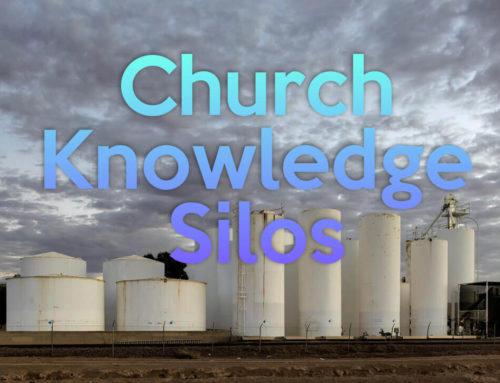When working to improve a church’s website or search engine optimization (SEO), one of the first questions I ask is, “what is your church’s greatest strength?” Typically I the answers I get fall into 2 categories. Either they say, “well, we’re pretty good at all of it.” Or they have a more generic but aspirational gifting, usually preaching or worship.
It is possible that your church is above average at nearly every possible gifting but that is extremely unlikely in the same way that an individual believer might be above average at nearly every gifting. There might be those magical unicorns out there but they aren’t reading this because they are already good at using digital media to evangelize and disciple.
It is even more possible that your church is gifted at preaching and has an extremely inspired worship service. But the fact is that most of those churches confuse where they spend the most of their time and resources with what they are most gifted at. A prime example of this is a church that I worked with a few years ago. I spoke individually with most of the senior staff members and they all either said “everything” or “preaching/worship.” They had somehow missed the fact that the church also had a school that had a MAJOR impact in the community. Their Wednesday night kids program was often double the size of their Sunday kids program. There were more salvations coming out of their kids program, including parents getting saved, than the rest of the church combined. And the majority of the new members were young families with children. But no one on staff even considered that the children’s ministry might be their area of gifting… including the children’s director!
All of this to say that it is important to identify and use your gifts and to offset and strengthen your weaknesses. This is just as true in your communications, marketing, and evangelism strategies. For the past several years social media has been a church communications darling. Many churches saw it as a way to connect, engage, and disciple church members all week long and not just on Sundays. And now there is a growing push back due to declining engagement and rising costs. That doesn’t mean you should quit social media altogether. But it does mean that you need to look at the strengths and weaknesses of each channel in your strategy.
-
Video is the future and video works best on social.
Video will account for 82% of internet traffic by 2021. And yes, YouTube counts as social media. But even if it didn’t each of the other social media businesses are trying to get a piece of that extremely big pie. The main reason for that is that advertisers will spend $40 billion more on internet than on tv this year. And that amount is growing as well. Engagement is higher on video on social than standard image or text posts and live video improves that even further. Currently, this beats out SEO because Google is unable to index the content of video (more on this later).
-
Social media is a conversation, not a broadcast.
And that is a good thing. Conversations empower both parties, which when you’re in the business of making disciples that’s a big deal. This aspect of social media has proven challenging for many churches to wrap their heads around since they are used to speaking from a pulpit, broadcasting on radio, and tv, or even just creating bulletins or email newsletters. But once you get the fact that Facebook and Instagram aren’t just for posting announcement you really can have meaningful conversations through social media. SEO is still more in line with the broadcast side of things.
-
Immediate feedback makes it more gratifying.
Marketing and communication are growing more and more complex and nuanced (hence this article). Most larger churches have communications directors with either marketing degrees or years of experience in the marketing world. Most pastors don’t have any of that. So pastors understandably tend to prioritize what they have the best grasp of, and since social media has that instant gratification with likes, shares, comments, and easy to see “boosting” that makes it a much easier sell for pastors. And even for experienced marketing directors, social media provides much better feedback and tracking than traditional marketing such as mailers, flyers, and billboards.
Great! So let’s go all in on social media then! I guess it was the perfect solution that has been promised for years.
Not so fast, though. Here are 3 pretty big ways that SEO beats out social media.
-
SEO is better for evangelization.
Search Engine Optimization is definitely less personal than social media. Kind of. A well optimized page can reach the right people at the right time in a way that social media has yet to catch up with. A local church can rank not only for the obvious like “church near me” but with some effort, they could also get seeker oriented keywords like “what to do in (my area)” or “how to meet people near me.” Very few evangelical churches pursue this strategy which means that it is a pretty wide open field…. Except for the fact that other religions have already figured out the value. This is a field so important that if we don’t evangelize it someone else will.
-
SEO is more cost effective.
Facebook is decreasing the rate of organic engagement year after year and is already a “pay-to-play” platform. If you want your posts seen by someone, even your followers, you need to “boost” it. But SEO, typically is more of a time investment than financial. It takes time to create quality content, it takes time to build links, and for small churches it can take time to even get indexed. But once it is out there, it is a strong foundation that you can constantly build on. Every piece of content that you create isn’t going to be a hit. But if you only have 4 or 5 high performing pieces a year, they typically stay high performing. Which means it grows exponentially. On social media if you have a high performing post, it is gone after a week or month at the most. SEO is forever (or close to it). That means its growth is compounding.
-
Thorough understanding of what is working, what isn’t, and how people are engaging.
Social media may have instant gratification but SEO has the potential for much more thorough analytics.You can understand what people in your community are connecting with, what they aren’t. It has the top down overview that most social media channels lack. This kind of insight is invaluable to a church that is willing to learn and to listen.
Obviously, you should take balanced approach if you have the time or resources. But if, like most churches, you are short on resources, then it might be beneficial to find the method that would work best for your needs and skill set.






